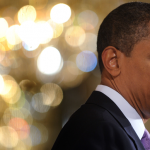"The Obama Presidency" (Excerpt from a high school text book 100 years from now)
The Presidency of Barack Obama
[Editor’s Note: The following is an excerpt from the Houghton-Nguyen-Acevedo 12th grade American History high school ebook text published in 2111)
The Bush Presidency, with its aggressively militaristic response to the Al Qaeda attacks and anti-intellectual bent, left Americans ready for a change of tone and approach in Washington, and in 2008 voters found the change in a young Senator from Illiinois who had skyrocketed into the political consciousness with a stirring keynote speech at the 2004 Democratic nominating convention. Barack Obama was an unlikely presidential candidate — of mixed race (which in 21st century America made him “black” in the eyes of many), born of a Kenyan father and white American mother, raised in Indonesia and Hawaii, Obama was a gifted orator whose message of inclusiveness and promise of intellectual discipline resonated with the American electorate, who swept him into office with 53% of the popular vote and, more importantly , 67% of the electoral vote.
While Obama’s ascendancy to the highest office in the land represented, for some, an inspiring embodiment of the evolution of America toward the multi-racial society that now defines America, for many whites his election represented a deep and ultimately unacceptable threat to the white-dominated culture that had defined America for it’s first 200 years as a nation. This resentment would create a remarkably unified and cohesive opposition, and would give rise to cries for the need to “take our country back” among certain white dominated segments of the population. Within weeks of Obama’s inauguration, a conservative splinter group known as the “Tea Party” with an intense, win-at-all-costs philosophy that social historians have since determined was largely racist in character, began to take shape. The Tea Party’s origins can be traced to a small gathering sponsored by a schoolteacher in Washington state on February 9, 2008, just days after Obama had signed into a law a $787B Economic Stimulus package designed to counter the economic devastation that the financial crisis of 2008-9 had produced. Days later a cable news commentator, Rick Santelli, unleashed an epic rant from the floor of the Chicago Board of Trade that included the threat of having “a Chicago Tea Party in July”. Santelli’s rant immediately achieved viral status on the social media platforms of the day, and the Tea Party movement was born.
The Tea Party claimed as its overt purpose the need to rein in big government – but its character as a white nationalist movement was recognized even by contemporary observers, who noted the largely white makeup of its contituents, which was whiter, older, wealthier, and more well-educated than the average American. Contemporary surveys, in particular a highly regarded survey by the University of Washington Institute for the Study of Ethnicity, Race & Sexuality, clearly established the racial nature of the the Tea Party movement. When read the statement that “if blacks would only try harder, they could be just as well off as whites,” 73 percent of the movement’s supporters agreed, while only 33 percent of people who disapproved of the Tea Party agreed. The same study asked respondents whether blacks should be forced to work they way up in the system “without special favors,” and 88 percent of supporters agreed, compared to 56 percent of opponents. Similar negative opinions of Latinos and other immigrant groups were also revealed in this and other studies, including a New York Times/CBS News survey which found that Tea Party supporters strongly identified with the statement that: “the Obama administration favors blacks over whites” and that “too much has been made of the problems facing black people.”
The emergence of the Tea Party and the presence of a black American in the White House served as the “perfect storm” necessary to coalesce the latent racism that many contemporary observers thought had been defeated in America of the 21st Century. The mid-term elections saw the Tea Party gain a significant presence in the US House of Representatives, and with it began what would become known as the Era of Intransigence in American politics. Traditional house Republicans were unable to control the new radical wing of the party; the filibuster was used as a routine procedure, creating a situation unique in American political history wherein the majority party was thwarted from enacting any significant legislation in which they could not achieve a 60 vote “Super Majority”.
The election campaign of 2012 saw the beginnings of the transformation of the Tea Party into what would become the White Nationalist Movement that would play a critical factor in the economic decline and social unrest that would plague America for much of the 21st Century………
Year of the Spy Book Trailer
Above is the Year of the Spy Book Trailer — for my upcoming non-fiction book about espionage upheavals on the streets of Moscow in 1985.
Below is a “trailer” showcasing the writing and video services I provide to clients.
Michael Sellers — Writing and Video Services
My eBook — Just released Dec 5, 2012
EBook You don't need a Kindle or iPad -- Download Adobe Digital Editions for Free, then read the .mobi (Kindle Format) or .epub (Nook, iPad Format) digital book on your computer. Or order the PDF which is formatted exactly like the print book.Recent Posts
- Arsha Sellers — Today I’m One Big Step Closer to Becoming a Real Forever Dad
- Meet Abby Sellers and Arshavin Sellers — My Wife, My Son, My Inspiration Every Day
- What the Mueller Report Actually Says
- Remembering James Blount, an American Who “Got” the Philippines in 1901
- America the Beautiful? You Mean America the Pitiful. I Am Ashamed





